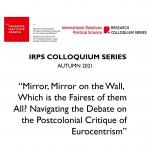Mirror, Mirror on the Wall, Which is the Fairest of them All? Navigating the Debate on the Postcolonial Critique of Eurocentrism.
Abstract:
For a couple of decades now postcolonial IR has moved from a small cottage industry into something much larger, at least outside of the narrow parameters of US IR. It is now a commonplace to find articles and indeed books that critique Eurocentrism. But what exactly is Eurocentrism? In the 2000s I felt sure that I knew what it is, but then later on I (belatedly) came across Immanuel Wallerstein's 1997 argument in his NLR article 'Eurocentrism and its Avatars'. Up till then I had assumed that Eurocentrism effectively denies the Western imperial moment in IR on the one hand and simultaneously ignores the presence of non-Western agency, given the preference to reify (and celebrate) Western hyper-agency in the making of the modern world. And that accordingly, the 'antidote' to Eurocentrism is to both bring the Western imperial moment to the fore as well as give a significant place to non-Western agency in the making of the West and of world politics/global political economy. But Wallerstein claims that bringing in non-Western agency as a means to counter Eurocentrism is itself a Eurocentric move (and that, by implication, I am a Eurocentric). And I realise too that this position is found explicitly in the approach of Alina Sajed and Naeem Inayatullah but, more importantly, albeit implicitly, in a lot of postcolonial and indeed critical IR/IPE. Much of my thinking in the last decade has been how to reply to this. The result is my new 2021 book and this paper is distilled from chapter 1 of that book. In essence, while there are important things that I take from this alternative approach, nevertheless I call it critical 'Eurofetishism' because it fetishises the West and reproduces many of the Eurocentric hallmarks but with a crucial twist: that it is imperative to fetishise the West precisely so as to prosecute it in the critical academic court of social justice for its crimes against global humanity. While I have a clear view as to how to proceed viz the critique of Eurofetishism I want to bring this debate forward and let my audience decide. But my audience should be warned: this is (unfortunately) not a tame exchange of ideas!
Biography
John M. Hobson is Professor of Politics & International Relations at the University of Sheffield and is a Fellow of the British Academy. His work is situated in the vortex of IR, IPE and global historical sociology and he is primarily interested in the critique of Eurocentrism (or what he now calls ‘subliminal cultural racism’). To this end he has published three monographs: The Eastern Origins of Western Civilisation (CUP, 2004); The Eurocentric Conception of World Politics (CUP, 2012); Multicultural Origins of the Global Economy (CUP, 2021). He has an online first article coming out in Security Dialogue later this year entitled: ‘Unmasking the racism of Orthodox IR/IPE’.




